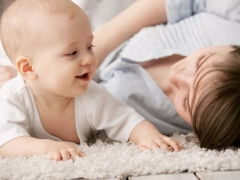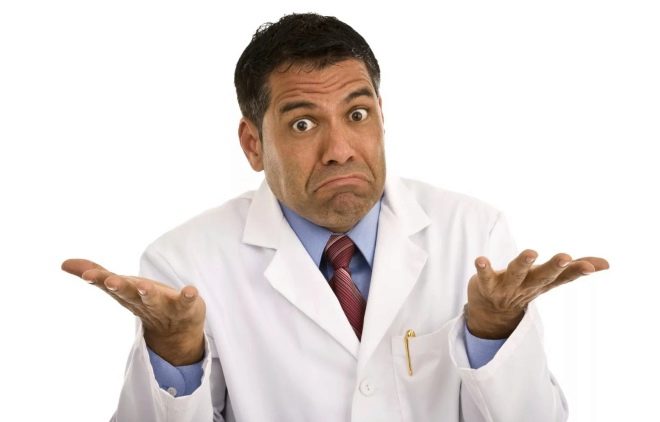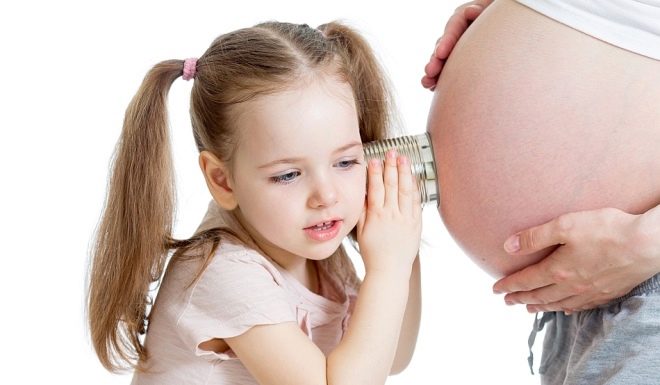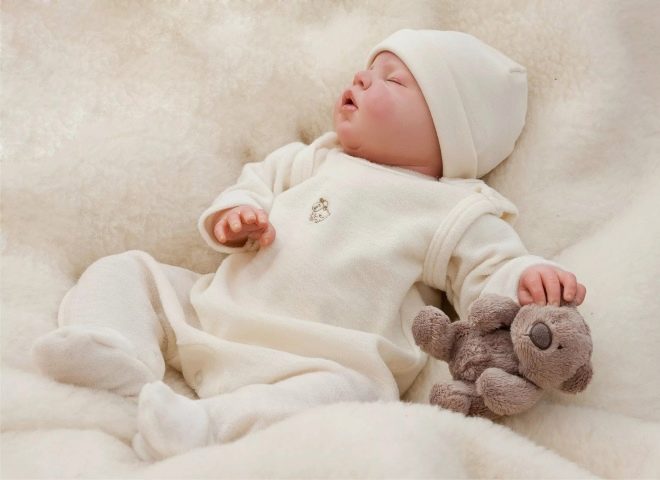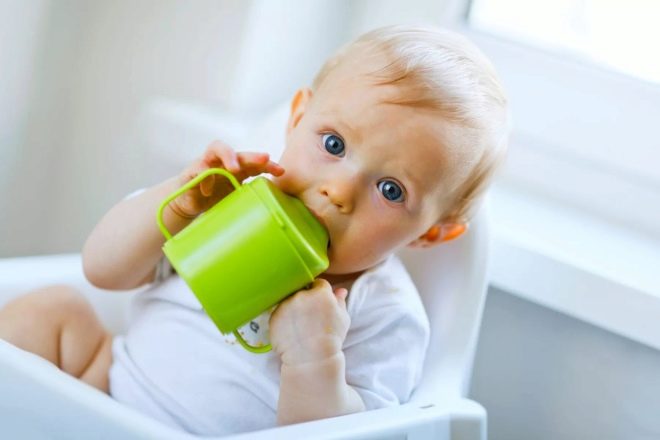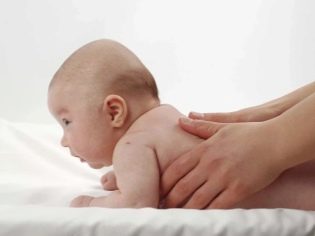Everything about baby hiccups
Hiccups in children happens often. This is one of the first physiological actions that a child “masters”, while still in womb. A baby’s hiccup usually doesn’t cause concern to parents - if it doesn’t occur several times a day and with protracted seizures. After reading this article, you will learn why hiccups occur and how to help the child.
What it is?
Hiccups are phrenic spasms, contractions of the diaphragm and intercostal muscles, which are jerky. These movements always take place serially and cause discomfort. With such movements of the diaphragm, the external respiration is disturbed. This is due to the fact that muscle contractions imitate inhalation, and the epiglottis sharply “slams”, creating the effect of suffocation.
When the air is blocked, the same sound is created, which gave the name to this physiological phenomenon - “ik”. It is believed that in this way the body is freed from air trapped in the stomach. However, pathological hiccups have completely different roots - these can be tumors, diseases of the nervous system, and inflammatory processes occurring in the internal organs.
These options have nothing to do with fetal hiccups in the womb. The causes of such hiccups are usually several - from physiological (ingestion of amniotic fluid) to idiopathic (unexplainable from the point of view of science).
Kinds
Hiccups in a child can be different, and it is important for parents to learn to distinguish normal hiccups from the disease state:
- Episodic (periodic) hiccups. She is completely safe. In everyday life, such attacks occur with all children without exception.
- Periodic hiccups usually goes by itself (within a few minutes, maximum - half an hour). It is caused by quite ordinary things - overeating, hypothermia, fear.
Hiccups in children can even begin from prolonged intense laughter:
- Frequent and prolonged hiccups. May be a signal of various disorders in the body. Daily long hiccups that plague a child and which cannot be eliminated by ordinary measures require examination by specialists.
- Idiopathic hiccups Such hiccups are very rare. It does not fit into the periodic framework, since it happens quite often, but it also has no pathological prerequisites. Doctors can not make a diagnosis, since the cause of the reflex contraction of the diaphragm remains unclear.
Causes
The causes of hiccups are not fully known to modern medicine and science. However, there are generally accepted ideas about why a child hiccups. At different ages, the causes of hiccups may be different.
In babies during pregnancy
Although this phenomenon is more than mysterious, pathology is not a cause for concern for the future mother should not act. Intrauterine hiccups do not cause unpleasant or painful feelings and sufferings to the child.
At the end of the first trimester, the fetus begins to suck on the finger, and a swallowing reflex is formed. There is nothing strange in the fact that the crumb swallows the surrounding amniotic fluid. Sometimes the amount swallowed exceeds the capacity of the child, the stomach becomes over-stretched, and the crumb begins to get rid of excess, burping and rejecting water through diaphragmatic contractions.
It is believed that the taste of amniotic fluid also affects the frequency of hiccups - the more mother pampers herself with sweets, the more pleasant for the child the taste of amniotic fluid. He will swallow more delicious waters.
Another possible reason, which has no scientific confirmation, is that hiccups are a kind of training in performing respiratory movements, which then (after birth) will be natural and involuntary.
The version that a baby in the womb may hiccup due to hypoxia (oxygen deficiency) is perceived critically by neonatologists. Indirectly, such a pathological condition may indicate a change in fetal behavior (increased or slowed movement, including increased icing movements), but a direct relationship with hiccups has not yet been established.
In newborns and infants
In newborns and babies, the process of hiccups is usually not associated with digestion, but with the development of the nervous system. Such a hiccup is also not a pathology and a reason for urgent medical examination. It does not greatly interfere with the child, is a temporary phenomenon.
In addition, babies who were recently born were greatly influenced by external stimuli, which adults and older children simply do not pay attention to. This, for example, temperature drops.
When hypothermia baby reflexively begins to hiccup, and this process has nothing to do with digestion.
But overfeeding, to which many caring parents are inclined, just has the most direct relation to the reduction of the diaphragm. In addition, infants often swallow air when making sucking and swallowing movements.
If the vagus or phrenic nerve is overexcited, infant hiccups may also begin. This may be possible as a result of stress, an abundance of impressions, tension of the nervous system. If there are many guests in the house, noisy, too bright light, loud music, the child cannot fully get enough sleep - all this can cause a sudden attack of hiccups.
Thirst, laughter, too active games with parents, in which the child literally “forgets how to breathe” (throwing a baby into the air, for example), can also cause hiccups in infants.
All these reasons are physiological, they do not carry dangers in themselves - and with proper first aid they pass quickly enough.
In children older than 1 year
In children who have gone out of infancy, reflex diaphragm contractions can be caused by unhealthy diet — a large amount of food, a bad habit of eating a dry meal, eating hastily, swallowing food in large chunks, a small amount of fluid consumed. If the child does not follow the drinking regime, drinks too little water, then he hiccups, as a rule, much more often.
The vagus nerve that passes through the diaphragm may be clamped if the child assumes an uncomfortable posture. He is more likely to begin to hiccup when he takes a very sharp breath during a strong startle. All these reasons are safe for children and do not require special medical care.
Signs of illness
Painful diaphragmatic spasms can occur with ailments associated with significant disorders in the central nervous system (CNS). This happens, for example, with encephalitis or meningoencephalitis. Sometimes the rhythmic contractions of the diaphragmatic septum develop on the background of baked, renal or diabetic coma.
Damage caused by traumatic brain injury, concussion, brain contusion can also serve as a trigger for protracted and exhausting attacks of hiccups, which will return with an enviable consistency.
Sometimes pathological hiccups are a precursor to a critical increase. intracranial pressure. It happens so that it develops against the background of pinching of nerve endings in the fourth cervical vertebra, against the background of lymphogranulomatosis, as well as esophageal tumors.
Often, painful hiccups cause gastritis and duodenal inflammation, intestinal obstruction, gallbladder disease. Help:
Fetus
The baby in the womb does not need help with hiccups. Rhythmic "tapping" in the stomach more interfere with the very future mother than her child. If the fetal hiccups prevent rest and sleep, a woman can walk in the fresh air, do breathing exercises, take a knee-elbow posture for 10-15 minutes. Usually this somewhat calms the child and brings a long-awaited peace to the woman.
Newborn and baby
A baby with a hiccup can be given a small amount of warm water to drink. After eating, to prevent regurgitation and prevent hiccups, it is necessary to hold the baby upright for some time, so that the air trapped in the stomach and esophagus comes out with belching.
Putting the hiccups in the baby will help laying on the tummy. If the child hiccups due to hypothermia, then it should be heated as soon as possible. As soon as he gets warm, the hiccups will stop.
If the child began to hiccup because of fright, strong emotional turmoil, too active games or continuous laughter, he should be quieted as soon as possible, turned his attention to something more calm, and allowed to drink a small amount of warm water.
A child older than a year
Quickly stop the attack of hiccups by straightening the diaphragm. To do this, take a deep slow breath. Hold the air inside the lungs for as long as possible and exhale slowly. If necessary, this exercise is repeated several times.
An older child can quite successfully cope with a more difficult task — to take a few small sips of water while holding his breath. This method also allows you to quickly get rid of hiccups.
In some cases, sour berries and fruits (cranberries, red currants, lemon or mandarin) help from hiccups. However, this method can only be used if one is completely sure that the child has no diseases of the stomach and intestines, as well as a tendency to allergic reactions.
Switching attention to a new type of activity helps to get rid of hiccups. If, at the moment of an attack, to show the child something interesting, to give it a look, to entice him, then the diaphragm spasms pass suddenly and very quickly.
With pathological hiccups
Help with pathological hiccups at home usually does not bring the desired result. Even if the parents manage to calm the child, warm and water him, give light sedatives - the attack repeats again and again.
The best help with such an attack is to contact a pediatrician. To the aid of this specialist will come the possibilities of modern diagnostics and doctors of other specialties - a gastroenterologist, a neurologist, a cardiologist, a neurosurgeon. Most cases of unhealthy hiccups pass without a trace after the child receives the necessary treatment for the underlying disease.
Interesting Facts
How little-studied phenomenon hiccups grows over myths and prejudices, and also associated with it curious facts:
- In the early 20th century in Italy practiced an unusual way of dealing with hiccups. While the whole world was breathing deeply, drank water and ate lemons, the Italians came up with a tongue sticking out at hiccups. And they tried to do this for the maximum length. Judging by the fact that the fact reached our days, Italian children and adults helped.
- In 2006, Francis Fesmire (an American doctor at the University Hospital of Florida) and three of his colleagues from Israel invented a hiccup massage. They found out and proved that a rectal finger massage helps to get rid of the attack as quickly as possible. For this great discovery, the American doctor and his comrades were awarded the Nobel Prize for the most ridiculous achievements in the field of medicine.
- The longest hiccups in the world history was registered in 1922 (in the USA). Charles Osborne decided to slaughter a pig - and at that moment began to hiccup. Hiccups lasted exactly 68 years. The man had to hiccup about 400 million times. The treatment was unsuccessful. However, Osborne was able to marry and have children - despite the constant diaphragmatic spasm.
- In Russia, there is the following belief: when a person hiccups, someone remembers him. If, at the moment of an attack, to start sorting the names of acquaintances and friends who could do this at the moment, the hiccup will stop when the correct name is called. This belief has no scientific rationale.
Why do babies hiccup after feeding? Look for the answer to this question in the next video.
